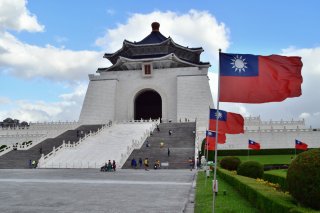Taiwan’s New Southbound Policy: A Strategic Triumph
Taiwan must build on its recent successes in increasing engagement with Asian states.
In January 2024, Taiwan will hold its presidential election to choose its next leader. President Tsai Ing-wen, currently in her second term, will soon conclude her tenure as mandated by the constitution's two-term limit. Her tenure has been marked by several noteworthy developments, with one of the most pivotal decisions being the launch of the New Southbound Policy in 2016. This policy was designed to broaden Taiwan’s economic engagement and strengthen its foreign relations. It encompasses eighteen countries from South Asia, Southeast Asia, and Oceania, focusing on eight key target countries.
With the Democratic Progressive Party (DPP) at the helm, Taiwan has successfully raised its regional profile, and Taiwan’s foreign policy is no longer solely focused on the West or China. Since 2016, a noteworthy development has been the continuous effort to foster strong relations with its immediate and extended neighbors.
Taiwan’s Window to Asia
There have been several tangible benefits that Taiwan has achieved through the implementation of the New Southbound Policy. It would not be an overstatement to describe this policy as a holistic approach to Taiwan’s foreign relations. The initiation of this policy has meaningfully enhanced the institutionalization of Taiwan’s engagements with countries to its south, particularly those that had previously received limited attention from Taiwan. Before the initiation of the policy, Taiwan, as an Asian country, had fewer substantial ties or linkages within its geographical region. Taiwan’s implementation of the New Southbound Policy and its utilization of medical diplomacy during the COVID-19 pandemic have significantly enhanced Taiwan’s engagement with the countries in the region.
Furthermore, the New Southbound Policy also served as a gateway to the Indo-Pacific region. During the 2022 Yushan Forum, an annual dialogue dedicated to Taiwan’s relationships with New Southbound Policy countries, President Tsai connected the New Southbound Policy with the country’s broader Indo-Pacific strategy. She affirmed, “The New Southbound Policy is at the center of Taiwan’s own Indo-Pacific strategy. Through this policy, we are working to bolster our security and economic ties with partners across the region.”
A Unique Response to China’s Aggression
Seven years since its inception, the New Southbound Policy has consistently delivered striking outcomes in trade and investment. For instance, between 2016 and 2022, the overall bilateral trade between Taiwan and the New Southbound Policy countries surged by an impressive 88.2 percent, with investment demonstrating similar notable growth. In 2022, Taiwan’s investments in the New Southbound Policy partner countries surpassed those in China. Even more significantly, the New Southbound Policy has actively and effectively enabled Taiwanese businesses to generate higher profits than those earned from China.
Government-led initiatives have furthered the establishment of regional networks, including Bilateral Investment Agreements, mutual recognition agreements, memorandums on the avoidance of double taxation, investment guarantee agreements, educational cooperation, talent development, and fostering quality enterprises, among other areas. These accomplishments have enhanced Taiwan’s ability to withstand China’s aggressive tactics and deepened its multifaceted partnerships with Indo-Pacific neighbors.
While the New Southbound Policy has its share of shortcomings and there is still much room for improvement, it has provided a unique and nonconventional response to China’s escalating aggression and its attempts to limit Taiwan’s international space. However, despite this obvious objective, the New Southbound Policy goes beyond the China factor. Through the policy, Taiwan has attempted to convey to the New Southbound Policy partner countries that Taiwan is much more than China and engagement with the government is mutually beneficial. This is one of the major reasons the New Southbound Policy is not focused on the security and political aspects of Taiwan’s foreign relations. Since many of the New Southbound Policy countries have been exercising caution to avoid crossing China’s perceived redlines, Taiwan’s strategic approach within the New Southbound Policy framework, which prioritizes enhancing economic cooperation, facilitating regional connectivity, promoting resource sharing, and fostering talent exchange, enables these countries to cultivate closer ties with Taiwan without being unduly concerned about the China factor.
What’s Next?
With the West increasingly focusing on the Indo-Pacific region, Taiwan must engage with Asia comprehensively. The New Southbound Policy has provided Taiwan with a valuable avenue due to its alignment with the policy objectives of several other countries, including India’s Act East Policy. As the upcoming election draws near, there is ongoing deliberation about the fate of this policy. While there still has been a lack of enthusiastic response to the New Southbound Policy, its mere existence has given Taiwan a structured framework for engagement. The multifaceted, non-security, and nonpolitical nature of the policy has allowed Taiwan to develop a blueprint that is well suited for the New Southbound Policy countries as well.
Since the onset of the pandemic, Taiwan has garnered renewed attention. This has presented a prime opportunity for Taiwan to bolster its engagement with and presence in Asia, and the policy framework has proven to be a valuable tool. As Taiwan enters a period of election frenzy, it becomes imperative not to overlook Taiwan’s crucial engagement with several significant Asian countries. Taiwan has become a focal point for both political and nonpolitical reasons in recent years, and the progress made should serve as a foundation for further development. To enhance its prominence in the region, Taiwan must maintain and advance the New Southbound Policy consistently. Given China’s consistent defiance of the rule of law and its threats to the rules-based order, it becomes increasingly vital for Asia to mirror Taiwan’s eagerness for engagement.
Alan H. Yang is a Professor at the Graduate Institute of East Asian Studies and Executive Director at the Taiwan-Asia Exchange Foundation (TAEF).
Sana Hashmi is a Fellow at TAEF and George H. W. Foundation for U.S.-China Relations. She tweets @sanahashmi1.
Image: Shutterstock.

